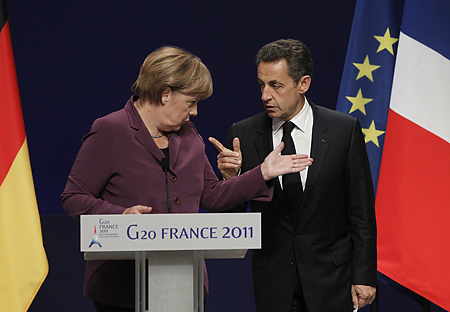
German Chancellor Angela Merkel and French President Nicolas Sarkozy talk to each other prior to holding a joint press conference in Cannes, France, on November 2, 2011 on the eve of the G20 Summit of Heads of State and Government. (Photo: Thomas Coex / AFP / Getty Images)
The seamless partnership France and Germany forged in past weeks now shows signs of fraying as both countries spar over the role of the European Central Bank (ECB) and proposals to mutualize euro zone debt. By pooling financial liabilities and assets across the 17-nation euro zone, stronger nations like Germany and France could back up floundering partners like Italy, Greece, and Spain. Time is of the essence. On Thursday, Madrid saw its borrowing costs rise to an all-time high.
Germany, not illogically, has resisted calls for fitter euro nations to cast their fate with those of the weak. Berlin has sternly argued that countries that have already done the hard work of reforming shouldn’t be thrown into the same pool of those that have now gotten in the deep trouble by avoiding the chore. The French have gone along with that line in recent months and, in the last few weeks, has forged a united front with the Germans in dealing with manifestations of the crisis in Greece and Italy. Now, however, market pressure on French bond rates is forcing Paris to revert to its previous insistence on using the ECB as a collective backstop for all European debt.
Indeed, the markets have apparently decided that France will become the next front in the offensive on the euro. Investor concerns about France’s medium-term stability have driven interest rates on French bonds to an all-time high. And those may shoot higher still as speculation grows that Paris may lose its AAA credit rating soon. With the situation urgent, French officials feel they can no longer bow to Germany positions against giving the ECB a larger role in backing-up the euro. The sentiment appears to be emanating from the closest circles of French President Nicolas Sarkozy. “We consider that the best way to avoid contagion is to have a solid firewall” in the form of an activist ECB, French Economy Minister Fran[ce {c}]ois Baroin said in a speech Wednesday. “We haven’t won the argument. We won’t make it a casus belli, but naturally we continue to think it would be the best way to bring stability to Europe.” Said Budget Minister Valerie Pecresse, “The ECB’s role is to ensure the stability of the euro, but also the financial stability of Europe.”
However, German Chancellor Angela Merkel made it clear on Thursday that her position wasn’t changing. Her status as leader of Europe’s most powerful economy means she won’t be caving any time soon. “If politicians believe the ECB can solve the problem of the euro’s weakness, then they’re trying to convince themselves of something that won’t happen,” Merkel warned Thursday. “European treaties don’t allow the ECB the possibility to resolve the [euro’s] problems.”
Those clashing views mean the “Merkozy” duo that had appeared so united and in sync in responding to the debt crisis over the past few months may split back into its pre-fusion components. But, while Merkel retains her aura as Europe’s chief get-things-done leader acting in disciplined defense of Germany’s lean and competitive economy, Sarkozy faces an uphill re-election bid and can’t afford to see France become the next victim of the crisis. The polls are six months away but France is already under attack. Wooing Merkel to his side of the ECB debate may be his only real chance at halting both the market offensive and electoral catastrophe.
By calling for the ECB to be used to guarantee all euro zone debt, Paris is hoping that a Big Bertha riposte to markets may halt their pressure on French debt, and save the euro at the same time. Because If France, the second largest economy in the euro zone, were to find itself also unable to finance borrowing costs and service its debt, there would not be enough mass at the core of the euro zone to save the currency. If France goes, so does the euro.
That scenario would be unacceptable for Germany, which has been key to the concept, institution and survival of the single European currency. Sarkozy is hoping Merkel and the majority of Germany voters who applaud her stern ways may now find themselves ready to accept using the ECB to underwrite all euro zone debt as the lesser evil. For now, however, there’s no hint of any give from Berlin, which limits its proposed remedies to bail-out measures already in place, and adoption of far stricter, legally binding budget rules banning deficits across the euro zone.
That’s a principled stand. But virtue has never been sufficient to quell market clamor. Already, French rates are alarmingly high even before the debt crisis has reached France in earnest. That means something in the Franco-German standoff has to give soon. And the word on what happens next will be German.

